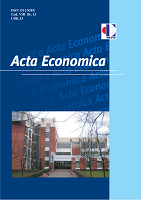КЛАСТЕРИЗАЦИЈА - НОВА ПАРАДИГМА ИЛИ ЈОШ ЈЕДАН ТЕОРИЈСКИ МОДЕЛ
CLUSTERING - A NEW PARADIGM OR ANOTHER THEORETICAL MODEL
Author(s): Saša Petković, Jelena Trivić, Brana LatinovićSubject(s): National Economy, Business Economy / Management, Economic development
Published by: Економски факултет Универзитета у Бањој Луци
Keywords: small and medium-sized enterprises; clusters; innovation; economic growth and development;
Summary/Abstract: Economy of Bosnia and Herzegovina (B&H) and Republic of Srpska is still not showing a signs of recovery and out of the economic crises. Unlike the large number of developed countries that have recognized the possibilities of clustering as a model of strengthening small and medium-sized enterprises (SMEs) and overcoming negative effects of the global economic crisis in B&H clustering is not recognized as a model of economic development. The aim of the research is seeking an answer on the question which dominant factors affecting the association of SMEs in clusters in Republic of Srpska and which factors are discouraging and slowing down this association? The research was conducted on the territory of the ten cities and municipalities in Republic of Srpska through random sampling method consisted by 106 SMEs (85 companies from research samples are not members of the cluster, while 21 companies in the sample are members of the cluster). We came to the conclusion that in the Republic of Srpska clusters are recognized as one of the possibilities to encourage the SMEs development, and thus the competitiveness of the national economy, but the process has not gone far. Less than 30% of the companies in the sample in the Republic of Srpska is familiar with the work of clusters in general. Entering the cluster, companies evolving and growing as evidenced by the growth in the average number of employees in companies, members of the cluster, in the first quarter of 2013, compared to the year of entry of these enterprises in the cluster. Enterprises which are cluster members, in most cases are only partially satisfied with the performance of the cluster. Regarding the improvement of cluster, 61,9% of respondents believe that greater state support would affect the improvement of cluster, and 19,05% think that active engagement of cluster managers would contribute as well.
Journal: Acta Economica
- Issue Year: 13/2015
- Issue No: 22
- Page Range: 113-150
- Page Count: 38
- Language: Serbian

